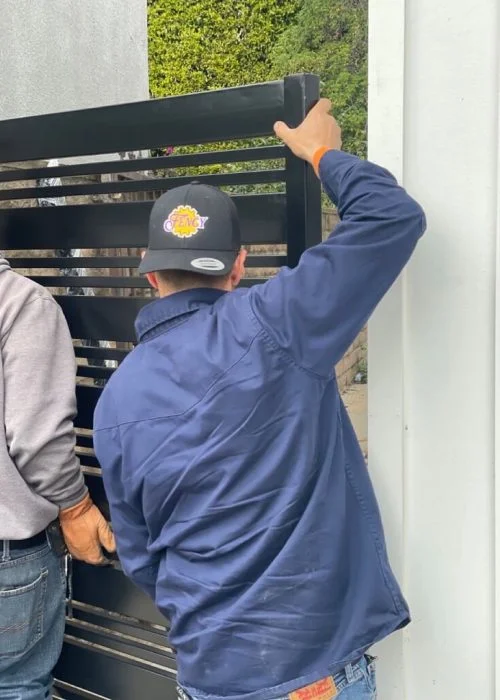Installing a gate on a sloped driveway can be a daunting task. The incline presents unique challenges that impact everything from gate alignment to movement and durability. However, with the right design, hardware, and installation techniques, it’s possible to create a secure and functional entrance on any slope.
Key Challenges in Installing Gates on Sloped Driveways
1. Uneven Ground Alignment
One of the most obvious challenges is the uneven ground that can prevent the gate from closing properly. The difference in ground levels can cause gaps at the base or result in the gate scraping against the surface.
- Impact: Misaligned gates can compromise security, reduce functionality, and lead to premature wear.
- Solution: Installing a custom gate with a tapered bottom edge that follows the slope of the driveway can maintain alignment. Alternatively, adjusting the gate’s height during installation can prevent scraping while ensuring a tight fit.
2. Gate Swing and Movement Issues
For swing gates, the incline can obstruct smooth opening and closing. On a sloped driveway, one side of the gate may swing uphill, making it difficult to operate manually or automatically.
- Impact: Difficulty in operation can be frustrating and may require excessive force or constant maintenance.
- Solution: Opt for uphill-swinging hinges that accommodate the incline, allowing the gate to open in the direction of the slope. These hinges are designed to help gates swing upwards, preventing them from dragging along the ground. Alternatively, a sliding gate can be a better option as it moves horizontally, avoiding the challenges of swinging against a slope.
Whether you’re considering gate installation in Jackson, TN or upgrading an existing gate, it’s essential to assess the driveway’s slope and select a solution that ensures smooth and hassle-free operation.
3. Structural Stability and Durability
The pressure exerted by the gate’s weight on an uneven base can lead to structural issues. Over time, this can cause wear on the gate’s frame, hinges, and support posts, resulting in misalignment or even gate failure.
- Impact: Compromised structural stability can lead to gate malfunction, security risks, and frequent repairs.
- Solution: To ensure structural integrity, use reinforced gate posts made of durable materials like steel or reinforced concrete. Proper anchoring of the posts and gate frame is critical to withstand the extra force exerted by the sloped ground.
4. Automation and Control Challenges
Automating a gate on a sloped driveway can be tricky, as the incline can interfere with the gate’s opening speed, alignment sensors, and safety mechanisms. If not installed properly, automated systems may face operational issues.
- Impact: Poor automation can result in unreliable performance, increased maintenance, and even potential safety risks.
- Solution: Choose high-quality gate operators specifically designed for sloped terrains. These operators offer adjustable force and speed settings, making it easier to accommodate the incline. Additionally, install sensors and safety features that account for the gate’s movement on a slope, ensuring safe and efficient operation.
5. Drainage and Water Flow
Sloped driveways often experience water runoff, which can lead to puddling, soil erosion, or even flooding near the gate area. This excess moisture can weaken the gate’s foundation and contribute to rust or rot in metal or wooden gates.
- Impact: Poor drainage can damage gate components, weaken the ground around the posts, and cause long-term issues like rust or decay.
- Solution: Install proper drainage systems, such as channel drains or French drains, around the gate area to divert water away from the foundation. Using rust-resistant materials, such as powder-coated metal, can also help prevent moisture-related damage.
See Also: The Value of Routine Upkeep for Commercial HVAC Systems
Conclusion
Installing a gate on a sloped driveway comes with its share of challenges, from ground alignment to gate movement and drainage concerns. However, these challenges can be effectively managed with the right design adjustments, hardware choices, and installation techniques. By opting for custom gates, reinforced posts, and advanced automation solutions, you can ensure a secure, durable, and functional gate system that complements your sloped driveway. Proper planning and professional installation are key to creating a safe and reliable entrance on any terrain.
FAQs
Q1: Can swing gates be installed on sloped driveways?
A: Yes, swing gates can be installed on sloped driveways using uphill-swinging hinges or by designing the gate to swing in the direction of the incline. Alternatively, sliding gates are a popular option for sloped terrains.
Q2: What is the best type of gate for sloped driveways?
A: Sliding gates are often the best option for sloped driveways, as they move horizontally rather than swinging, avoiding issues related to uneven ground.
Q3: How do I prevent drainage issues near the gate on a sloped driveway?
A: Proper drainage solutions, such as channel drains or French drains, can help divert water away from the gate area, preventing flooding, erosion, and foundation damage.
Q4: Is it possible to automate gates on a sloped driveway?
A: Yes, automated gates can be installed on sloped driveways using high-quality operators designed for inclines, with adjustable settings and sensors that account for the slope.




